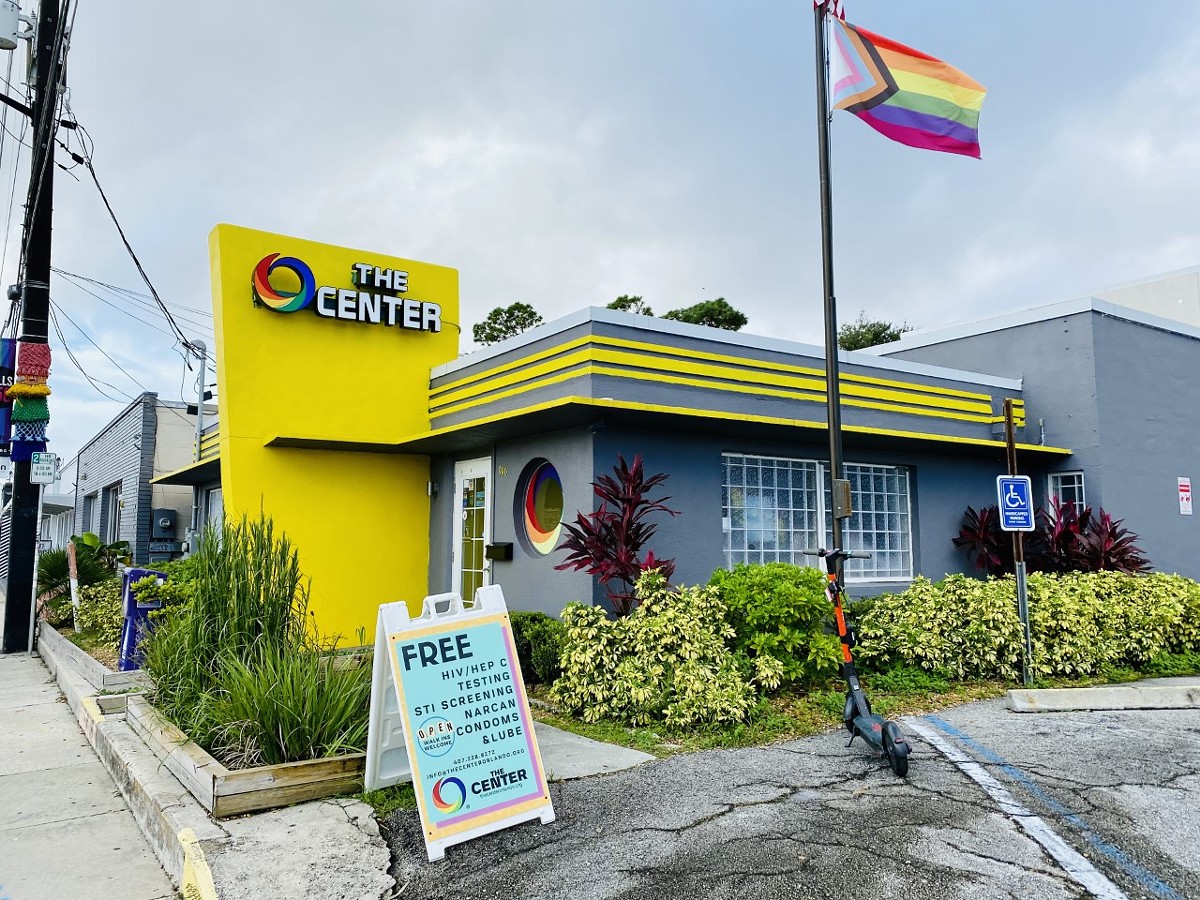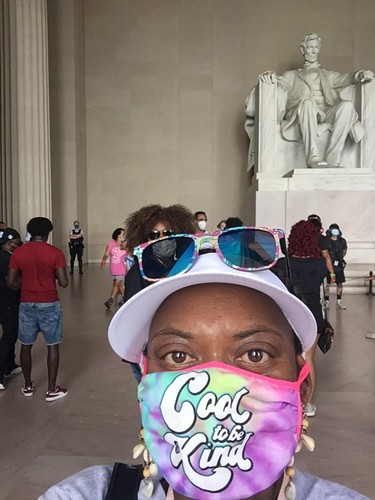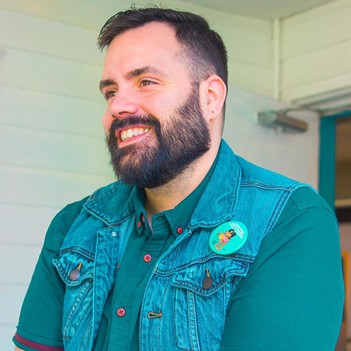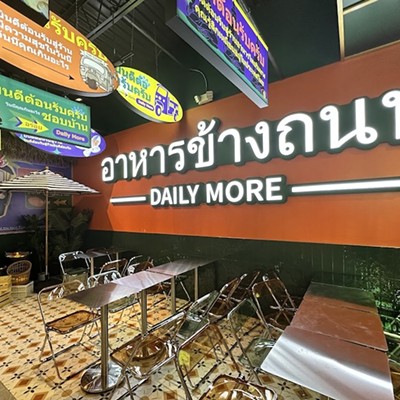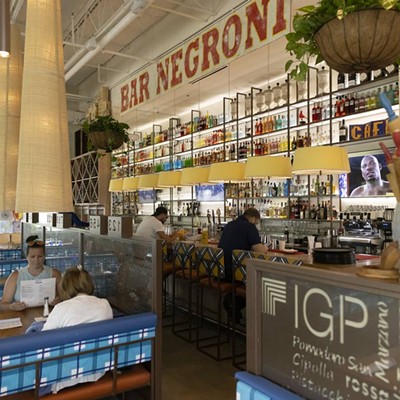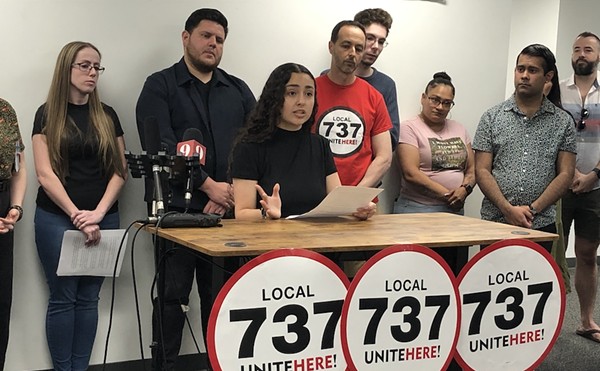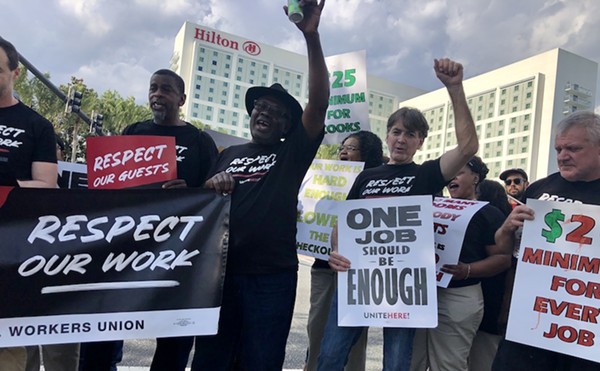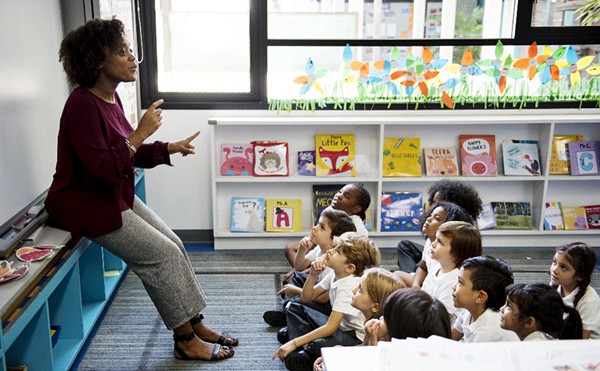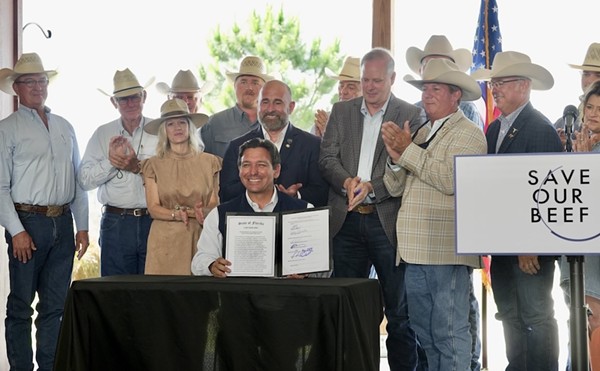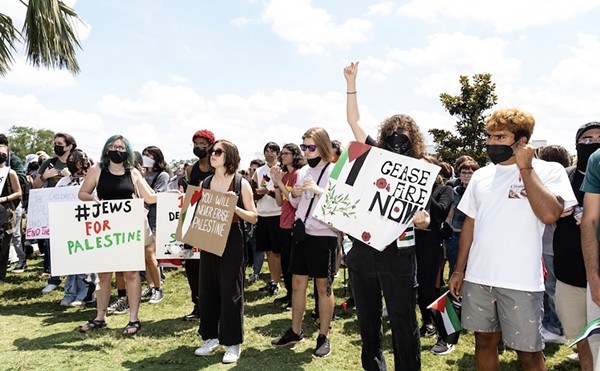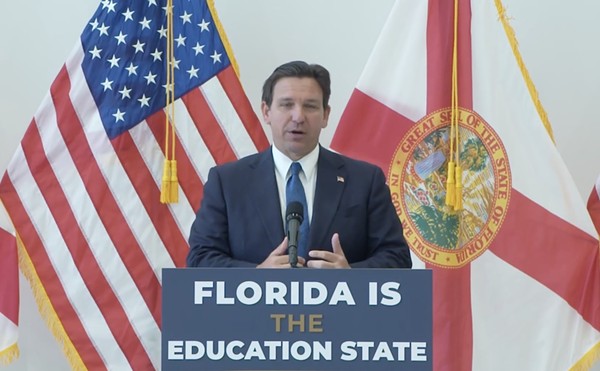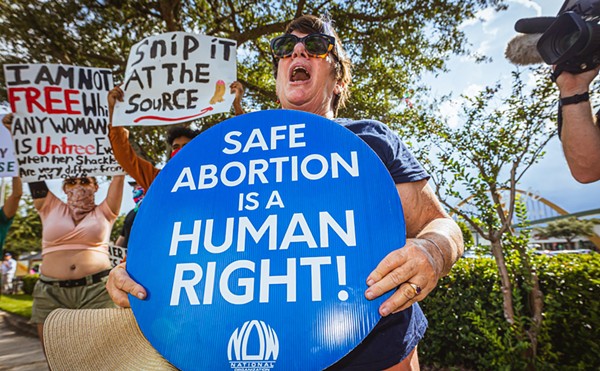Orlando's long-beloved Come Out With Pride celebration will look different in the year 2020, just like everything else. But it's not just the coronavirus and its many ill effects that's shaken the kaleidoscope. Community protests over the murders of George Floyd, Breonna Taylor, Tony McDade and too many more have changed the landscape as well, as marginalized persons become empowered to create change for themselves and others. Our Matthew Moyer spoke to community organizer Charlotte ChaCha Davis and the LGBT+ Center's Joél Junior Morales about the new normal for gay Orlando. – Jessica Bryce Young
Charlotte ChaCha Davis
You've just been announced as the one of the Grand Marshals of the Pride Parade this year ...
Davis: I'm very excited about this! I definitely didn't expect it, considering last year was the first year that we had Black and Caribbean LGBTQ+ representation actually in the parade, so that was already phenomenal, being able to present that to the community ... but to be Grand Marshal for this year's parade, I'm not really sure what words I can use but it's a great honor and I'm truly excited about it and the community is excited about it.
Usually Pride is built around large gatherings; it's going to be a little different this year.
It definitely is going to be a little different this year with COVID. But I think that it's going to bring forth new and interesting ways in how we communicate across the globe because so many others can be involved with our Pride this year that probably wouldn't have participated in it but now participate in it from their homes and from their phones. So I think the fact that it's going to be partially public and partially virtual is awesome. I'm grateful for whatever way we are able to celebrate.
Would you talk a little bit about #WeExist?
#WeExist was created out of the Pulse Orlando tragedy. I worked at Pulse for about five years as a picture lady, and then as an independent promoter, and then a contracted promoter. I frequented that spot. We had Platinum Fridays and my party which was Secret Sundays, which was predominantly hip-hop and R&B. And so being engaged in our community and having events, and I've been the sole promoter for Pride events for Black LGBTQ+ for over 10 years in Orlando affiliated with Orlando Black Pride and the Black Pride that we kind of created out of the fact that we didn't feel included in a lot of stuff.
So after the Pulse tragedy happened, I felt that there was a disconnect within the community. I often found myself in spaces where I was the only Black face, the only Black voice, the only person that was speaking up for Black and Caribbean LGBTQ+. So the hashtag #WeExist came about from having to almost prove the existence of a community that wasn't being talked about, and was being left out of a lot of scenarios with organizations. With everything that was going on, we just did not have a voice. So #WeExist was trying to prove the existence of a community that was left out.
And then it went to another level when I got more involved with the political arena and recognizing that within all the spaces, whether LGBTQ or just community-oriented, there were no spaces anywhere for Black LGBTQ. So I started to bridge the gap within organizations like FRRC, and being their chapter coordinator for the state of Florida for felons to get their rights restored, where a lot of those individuals were from our community because we do have a heavy population of ex-felons within our community, especially with the high rate of sex work and fraud and so many other things that our community engages with.
And so I started to bridge gaps with other communities, and then eventually "We Exist, We Vote" became our campaign, our Get Out the Vote campaign for Black and Caribbean LGBTQ, and that connects LGBTQ to get more involved and get more engaged in voter education. To prove that we do have a voice, there's power in our voices, and we do vote. And that was a signal to politicians that we weren't going to be left out.
So everybody's been rocking their #WeExist T-shirts and masks and it's been trending across the states, not just in Florida, but in New York and Georgia and North Carolina because of my connection with communities out of state from the experience that I have with being a promoter, and being very sociable within the Black and Caribbean LGBTQ communities and Latino communities, because I also worked on the Latin nights as well at Parliament House, Pulse and Revolution.
That's amazing that you sort of pivoted from event organizing for music into politics and activism. How did you apply some of the things you've done in music to your political work?
Marketing and knowing how to reach the community and reach out to the community in more creative ways, and meeting them where they are. And I also worked at Miracle of Love as an HIV testing counselor and then I ran the youth center for America Is Love, which was a gathering center back in 2000-and-something – I'm horrible with dates. So I've always been very engaged with the community, always been kind of the mother of the community. My house has always kind of been the shelter for the community.
I've utilized those same skills that I did to get people to party from one city to the next to get people engaged with voting. I did voter registrations at the club and our events and places that people weren't going to engage with our community.
Tell me a little bit about Beautiful Safe Beginnings.
Beautiful Safe Beginnings came into existence after I worked at Miracle of Love and my house kind of became the center. I had computers set up for people to continue to come and do their résumé, the back of my house was set up where I had three bunk beds so a lot of the individuals in the community, mostly boys at the time, the girls mostly stayed in my daughter's room, but the boys stayed in a large area. And my house became its own center.
I loved being a grass-roots organization, because it was being done out of my house to provide services for the community – like taking them to the doctor, they need to go to a doctor or picking up prescriptions that they need, calling their case managers when they're being ignored. It became a beautiful thing to get into. To offer who I am to the community.
Can you talk about your work with Let Your Voice Be Heard Inc.?
Miles [Mulrain] and I know so many people in our community. He would know the straight brother and I would know the gay sister. And we recognize that together we can reach both communities with the same messages. And this was the beginning of bridging a gap within our community as a whole, an intersectionality with the LGBTQ community and the straight community working on community issues, homelessness.
We do mentorship, we do voter engagement with the school system, going to schools for outreach, youth outreach to get our 16-year-olds to register to vote and our 17-year-olds prepared for voting in the next year.
And so in doing that work, if you have a straight male and a lesbian woman and the atmospheres that we are in are very diverse, so it actually worked itself out. Let Your Voice Be Heard was a way for us to uplift the voices of the LGBTQ community. And also the Black community as a whole, about things that were happening in our communities and our neighborhoods that we wanted help out with; the things that we were seeing, the young men that had no place to go ... It's just so much, it's really so much. And we just assist each other back and forth. I have a straight son, so I'm like the mom in the community to his friends, so I'm kind of like stretched out all across the community in different ways. But with my connection with all of the different organizations, I'm able to bring everybody on stage.
You and Let Your Voice Be Heard were both very involved in the anti-racism, anti-police brutality BLM protests this summer.
Yes, we were one of the lead organizers in the protests for George Floyd, Breonna Taylor, Tony McDade. And also utilizing that platform to uplift, to create a platform for and create spaces for the transgender community here to give their thoughts and participate in a national movement for the transgender community. The killing of Tony McDade was just days after George Floyd's killing.
We worked with a lot of different organizations, Organize Florida, the FRRC, Florida Student Power Network, People of 407 and just so many different collaborations that we've had over the past four years, calling people to action when it's time to raise the voices of the community and put pressure on our elected officials to do the things that we've elected them to do.
How do you stay hopeful?
I think the fact that nothing is at a standstill, everything is progressing in the right direction. I think seeing progress is what makes me feel the need to do the things that I do ... As long as those things continue to happen, I continue to stay hopeful that things will get different and better.
Do you see Orlando becoming a more inclusive city in the future?
Yes, I do and I do because I see it being acknowledged more. At one point I could say that it was heavily ignored and most people would act as if this wasn't a thing and it wasn't happening, and didn't quite understand why there was a need to amplify the voices and the names of the Black LGBTQ that have suffered through violence.
We've buried so many of our transgender sisters, even here in Orlando, like Mahogany [Singleton], who was murdered on Orange Blossom Trail. Or Sasha [Garden], who I met in the efforts to start that whole collaboration with the police department to be more sensitive to the transgender community when they misgendered her or labeled her as "a man with a wig." And at the end, having our voices in the forefront of those types of things ... and justice for people that can't fight for themselves or aren't here to fight for themselves anymore ... That's what makes me continue doing the things that I do.
Is there anything else that I've forgotten to ask about?
I don't think so ... I can go on and on and on, because I wear so many different hats. I think that you touched on all of those hats. There is the new role as the anti-racism liaison with the One Orlando Alliance, which, in the beginning I started out calling out that organization for the lack of visibility and transparency of the presence of Black and Caribbean LGBTQ. And to now be the anti-racism liaison over those now 40-plus organizations is a huge step in the right direction of getting us to being a more inclusive and diverse and anti-racist community.
Thank you for your time today.
Thank you so much. I'm super excited about this honor and again it comes as a total shock and surprise. I'm normally the person being ignored or the elephant in the room so to be honored it's kinda like, "Oh God, am I gonna be put in the trunk after this?"
I'm really excited about it and just thankful that I was chosen in this universe to speak up, and to know that it is creating different dialogue and different conversations and it's putting people in spaces they've never been in before. Putting 20 transgender Black women that have never been off of their street into Washington, D.C., to fight for their rights ... I just think that it's a beautiful thing and I'm glad to be a part of it.
Joél Junior Morales
How has the Center been rolling with the punches of COVID here in Orlando? How has your work changed and adapted?
Morales: My role with the Center has tremendously changed since the pandemic started and especially with the shutdowns, I can honestly say that we've been busier than ever.
Our whole mission is to empower the LGBTQ+ community and their allies through information, support and advocacy, and we're always going to be there. Through situations like Pulse, or just even from our past HIV activism. We were created because of the HIV and AIDS epidemic in the 1980s – the Center was established in 1978. We've always been on the frontline, so when the pandemic hit it really impacted, not only the way we fundraise, but we had to change the way we try to keep our doors open, and also think about new strategies and innovative ways to still serve the community in a very safe manner.
So we've had to shift a lot of the things we did prior to COVID. Our Community Center was open to the public. We provide HIV testing, STI testing, free mental health counseling, and then we had about 35 different groups that would meet at the Center [NA, AA, etc.].
When the pandemic hit, those vulnerable communities were really impacted and we had to shift them to meet virtually. So there was a learning curve when it came to educating our older population who're not as versed with technology. We wanted to make sure, even during our closure, that people were still connected to us somehow.
So that space was kind of lost, and we had to innovate it in ways to bring people to a virtual setting, and this is brand-new for a lot of people. Back in early March, we made the executive decision to close our doors, and our administrative staff was working behind the scenes building a new infrastructure to serve the community. During that time, we shifted our mental health program virtually so now it's via telehealth. I run that program, and our numbers right now show more people are accessing our mental health program than ever. We had to increase from two days to five days a week, including Saturdays.
Obviously, this is because a lot of people either lost their health insurance, they lost their jobs so they can no longer afford their therapists that they were seeing before, or they never had access to therapy and realize they need help, so I see my numbers grow dramatically for mental counseling programs right now. Even with five days a week, I'm booked out to like two weeks in advance.
It kind of resembles to me the time of Pulse. I was a second-line responder to Pulse, and I worked with families and survivors and helped create the Orlando United Assistance Center. And just seeing that, the way people feel when they don't have the available resources that either speak to them or understand their lived experiences ... I'm a queer, proud Puerto Rican, and I grew up really poor and I understand a lot of the struggles that LGBTQ+ people face especially when they've just come out. I experienced homelessness myself as a teenager, so I know and I can recognize that a lot of times it's really hard for LGBTQ+ people, our youth and even our seniors.
We took about a month to close just to make sure our practices were in place. ... Then we recognized needs, we started to build programming. Like now we have a new housing program for those impacted by COVID. We were also able to start a partnership with the Mustard Seed and do contactless clothing drives. Because Mustard Seed received clothing from American Eagle and they wanted it to go specifically to the LGBTQ+ community. We felt like it was a great partnership, and since we started that program we already gave about 250 families or individuals clothes from that program.
We also started a network in combination with other community partners called the LGBTQ+ Relief Fund, which gives about $100 directly to those that were impacted by COVID through furloughs. We've raised over $70,000 now, and every single dollar raised through the LGBTQ+ Mutual Aid goes back to the community. We've already given about 400 individuals funds, and many of those individuals say that they received that relief before even receiving their unemployment.
We do food banking now. We started giving out weekly food boxes and also we're taking donations to be able to give out to people. We bumped up our Narcan program – we have a partnership with the Department of Children and Families to give out Narcan. It's a medicine to help anyone who's experiencing an overdose. It's a lifesaver for anyone who's first at the scene. So now we have that product for free. And we have seen the numbers increase. People are relapsing because a lot of the groups are not available in person, especially the NA groups that are really popular at our Center. Now they're meeting virtually or in parks, but when you lose that support it's really hard for people.
Building our programs during the pandemic has been really difficult and rewarding at the same time. Orange County has helped us out tremendously. Historically we've never received any Orange County funding prior to this pandemic. But since we started the LGBTQ+ Relief Fund, we had all the numbers and all the documentation to show that there's a really large population of our LGBTQ+ community that either works in tourism or are sex workers; they're undocumented and they're not receiving the support that they need through the government, and our unemployment in general for everyone sucks.
And even with the [rent] moratoriums being extended and all that, that doesn't mean that our community members are not being harassed by their landlords; we're seeing it. We were able to tap into a grant and through the grant we were able to give up to $175,000 in rental assistance. We were able to help 20 families through that program so far. It ends at the end of December. I'm hoping to expand that more because through this program I was able to hire a full-time housing case manager which we didn't have before. So they're working through about the 300 people that are currently on our caseload that were impacted by COVID.
So there's a lot of programming that we had to change and just think about new creative ways to build new partnerships. Partnerships are so important. No one person has all the answers, no one organization has all the resources. It really takes a community. It really takes collaboration to move the needle forward.
Do you see mutual aid as a long-term solution?
I wish it wasn't the case, to be honest with you, I wish it didn't have to be this route when we know there's like billions of dollars coming into state and local government that's not really filtering down. And people don't know where that money goes or it just takes a really long time to get to the hands of people.
So this mutual aid concept, it is growing nationally. And I think it's a way communities can help each other with immediate needs, whereas government resources might take longer to come through. I do see this as something that hopefully other communities can use as leverage, at least for the time being.
I want to highlight the community partners who are part of the LGBTQ+ mutual aid. It's ourselves at the Center that disperse the money and we do the case management. But we have partners that help build this program, which include the Contigo Fund, QLatinX, Bros in Convo and the One Orlando Alliance. We all do different work in the community but we all have the same mission in mind when it comes to making sure that our most vulnerable are being seen and being uplifted and not being forgotten, as we've seen happen historically.
Would you talk about how the Center adapted to participate in the Black Lives Matter movement's work this year?
Our mission for the Black Lives Matter movement, we understand that there's a lot of work to do when it comes to anti-racism. We were working with the One Orlando Alliance, as part of their anti-racism team, and we're really pushing for community partners to just look inside and evaluate if their dollars are going equitably across the board to Black and brown bodies. We rate ourselves and we gave ourselves a "C," no one's going to be perfect in this and it's a long journey. So our thing is to support and continue working with other organizations to make sure that Black lives are in the front. It's not a one-time thing, it's a movement.
Walk me through a typical day at work.
When you work in a nonprofit, you never know what you're going to walk into. Last Friday, somebody tried to break into the Center. Or we'll receive a call that someone's on the street or homeless, and we try to find resources for that person that we are working with. ... A lot of times we're dealing with crises and putting out fires.
Not only do I work with the Center here, I also help other communities. So right now I'm working with the Virginia Beach Center. We're on call for other places and just talking to other Centers. There's a network called Centerlink and with Centerlink, all the LGBT+ Centers are connected in this network, so a lot of times we're able to share resources, which is exciting.
With the election and the pandemic and everything going on, what keeps you inspired to keep going?
I'm very hopeful that these elections have a good turnout and a lot of people come out to vote. ... It's coming down to survival. We need good leadership and planning. A lot of us, we're tired. We're literally tired because it's always a fight, and then more barriers are placed. Like we're hearing representatives talking about how voting should be hard, and that's not right. But I'm excited. I'm hopeful.
This is going to be a very different Pride celebration than ever before. Have you had any time to reflect on what Pride means to you in 2020?
At its core, it's always going to be the same. Pride is always going to be just living out and proud. But it is going to look a lot different. The way I'm looking at everything is, even though I am pretty Zoomed out at this point, this is like building a bigger network. The pandemic has forced us to go outside our own bubbles, our own networks, and get to know other people from other places and connect more easily.
So hopefully, in the future when we're all able to engage, we're able to engage locally but also nationally. I think it's a good way to connect with people. But it is going to be a somber month, not having that festival that kind of wraps up the year. But I know in my heart of hearts, Pride will always be there.

